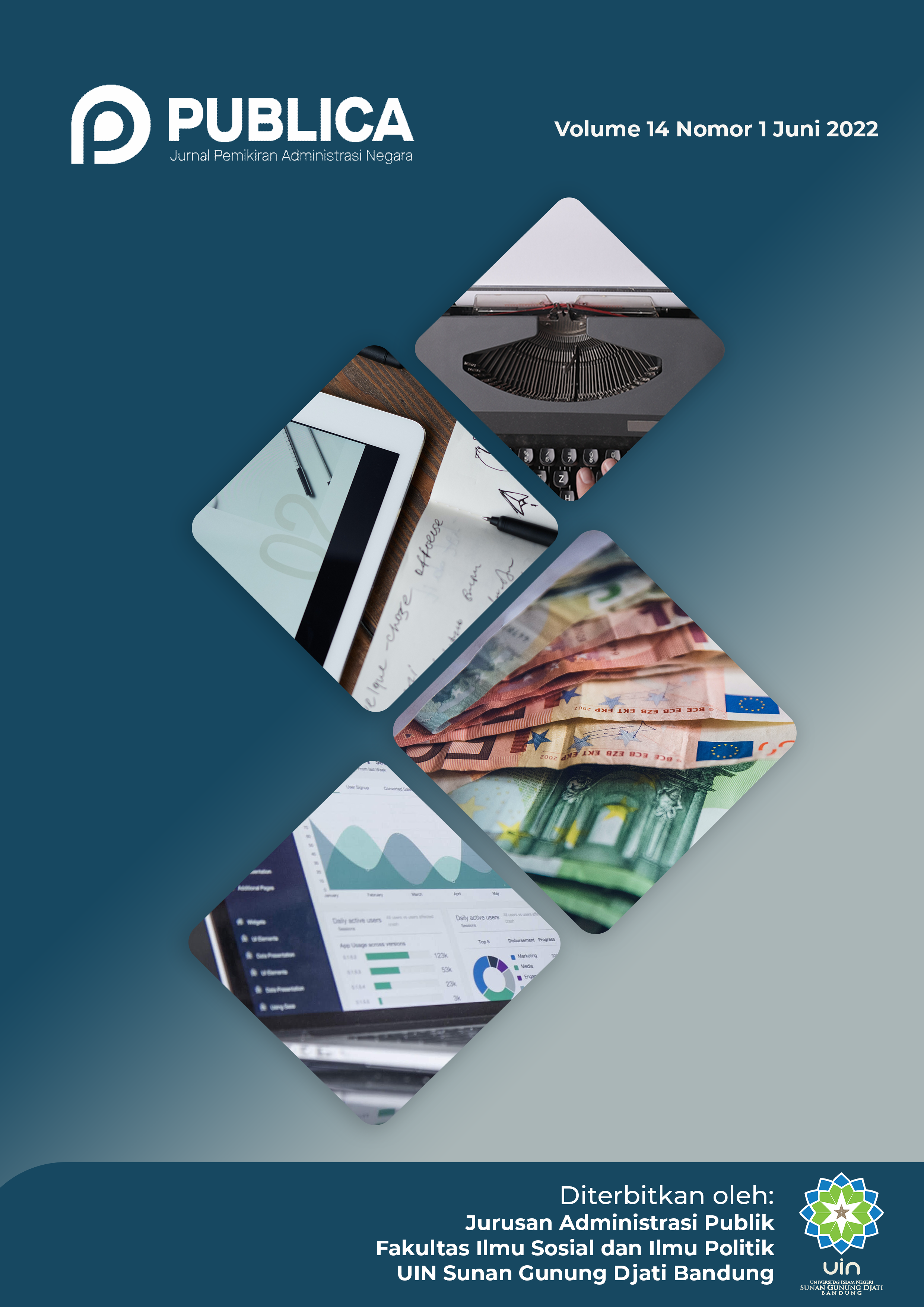The Public Value of e-Government at The Village Level
DOI:
https://doi.org/10.15575/jpan.v14i1.18011Keywords:
Community, e-Government, Technology, Public Service, VillageAbstract
The villages as a local government directly serve the public should always provide good public services. On this basis, this article analyzes how the implementation of e-Government by village governments can contribute positively to village`s governance and public service seen from a public values perspective. The research method used in this research is the descriptive research method with a qualitative approach. Sources of data come from secondary sources from books, journal articles and other relevant documents. The results of the analysis revealed that there are at least 3 (three) public values from the adoption of e-Government at the village level, namely: First, the commitment of the village government to provide technology-based public services would create good public services. Second, the implementation of e-Government ensures the public's right to participate in government administration in which the adoption of technology and information provides rights for open and collaborative governance. Third, the implementation of e-Government encourages the acceleration of a digital society which would contribute positively to village development and create public welfare.
References
Agusta, I. (2007). Indonesia dalam Pertautan Budaya Pembangunan dan Budaya Warga Desa. Jurnal Wacana, 9(2), 135–153.
Angkasawati. (2015). Masyarakat Desa. Jurnal Publiciana, 8(1), 1–23.
Creswell, J. W. (2007). Qualitative Inquiry and Research Design: Choosing Among Five Approaches. Thousand Oaks: Sage Publications.
Govindaraju, R., Wiratmadja, I. I., & Haryana, A. (2016). Pengembangan Model Evaluasi Kualitas Layanan Sistem E-Government. Jurnal Manajemen Teknologi, 15(2), 196–205.
Hamirul. (2017). Patologi Birokrasi Yang Dimanifestasikan Dalam Perilaku BirokratYang Bersifat Disfungsional. Otoritas: Jurnal Ilmu Pemerintahan, 7(1), 14–18.
Kementerian PANRB RI. (2015). Survey Persepsi 9 Program Reformasi Birokrasi. Jakarta. Retrieved from https://www.menpan.go.id/site/download/file/5025-survey-persepsi-9-program-reformasi-birokrasi
Layne, K., & Lee, J. (2001). Developing fully functional E-government: A four stage model. Government Information Quarterly, 18(2001), 122–136. https://doi.org/10.1016/S0740-624X(01)00066-1
Munawwarah, A. (2016). Sistem Kekerabatan Antara Masyarakat Pedesaan dan Perkotaan. Malang. Retrieved from http://syariah.uin-malang.ac.id/index.php/komunitas/blog-fakultas/entry/aisyatul-munawwarah-13210043
Nugraha, J. T. (2018). e-Government dan Pelayanan Publik (Studi Tentang Elemen Sukses Pengembangan e-Government di Pemerintah Kabupaten Sleman). Jurnal Komunikasi Dan Kajian Media, 2(1), 32–42.
Setiawan, A. (2020). Ketika Indeks e-Government Indonesia Naik 19 Peringkat. Retrieved June 28, 2021, from https://indonesia.go.id/kategori/kuliner/1946/ketika-indeks-e-government-indonesia-naik-19-peringkat
Sudarto, Y. (2006). E-Goverment Dan Reformasi Birokrasi Menuju Pemerintahan Yang Baik. In Konferensi Nasional Teknologi Informasi & Komunikasi untuk Indonesia (pp. 44–47). Bandung.
Sulismadi, Wahyudi, & Muslimin. (2016). Model Penguatan Kapasitas Pemerintah Desa dalam Menjalankan Fungsi Pemerintahan Berbasis Electronic Government (E-Government) menuju Pembangunan Desa Berdaya Saing. Malang.
Suparman, A. (2016). Desa dan Hak-Hak Tradisional. Jurnal Wawasan Hukum, 26(1), 464–470.
Wijaya, S., & Surendro, K. (2006). Strategic Planning for E-Govemment Implementation of Kabupaten/Kota at Indonesia. In Proceedings of iiWAS2006 (pp. 1–7).
Wisnuwijaya, S., & Kridanto, S. (2006). Strategic Planning for e-Government Implementation of Kabupaten/Kota at Indonesia. In iiWAS2006 (The 8th International Conference on Information Integration and Web-based Application & Services) (pp. 351–356). Yogyakarta.
Yunita, N. P., & Aprianto, R. D. (2018). Kondisi Terkini Perkembangan Pelaksanaan E-Government di Indonesia: Analisis Website. In Seminar Nasional Teknologi Informasi dan Komunikasi 2018 (SENTIKA 2018) (pp. 329–336). Yogyakarta.
Downloads
Published
Issue
Section
License
Authors who publish with this journal agree to the following terms:
- Authors retain copyright and grant the journal right of first publication with the work simultaneously licensed under an Attribution-ShareAlike 4.0 International that allows others to share the work with an acknowledgment of the work's authorship and initial publication in this journal.
- Authors are able to enter into separate, additional contractual arrangements for the non-exclusive distribution of the journal's published version of the work (e.g., post it to an institutional repository or publish it in a book), with an acknowledgment of its initial publication in this journal.
- Authors are permitted and encouraged to post their work online (e.g., in institutional repositories or on their website) prior to and during the submission process, as it can lead to productive exchanges, as well as earlier and greater citation of published work (See The Effect of Open Access).
